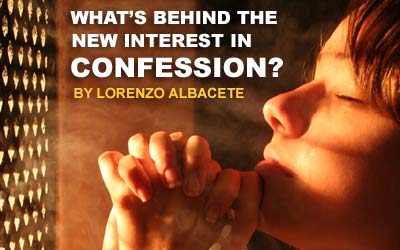Faith
What’s Behind the New Interest in Confession?

Confession of sins is making a comeback. Catholics, other-Christians, non-Christians, and even non-believers are reported to be embracing the practice in traditional and non-traditional ways.
As a Catholic priest who hears confessions, and as a sinner who needs it, I welcome the new interest in the forgiveness of sins as an opportunity for spiritual growth. Indeed, the roots of the urge to confess our sins lie deep in the human heart. I believe that the impulse to confess deeds that weigh on our conscience can be a healthy affirmation of ties that bind us all. This experience of solidarity is the beginning of that sense of social responsibility upon which our survival depends. From this point of view, the reported popularity of confession is a welcome development. However, this is only a beginning.
The question immediately surfaces: if our sins really damage the ties that bind us, can the practice of confession really repair them, or is confession only a way to overcome the pain of guilt? In that case, a ritualistic confession can become a way to escape the responsibility of dealing with the real harm done to others and to ourselves by our actions.
The key to a healthy understanding of the value of confession lies in the recognition of the real, objective social nature of the drama of sin and forgiveness. This recognition has always been part of the traditional ritual practice of confession, even after the “one-on-one” encounter between the penitent and the confessor replaced ceremonies that included a public recognition and confession of certain sins. And although the absolution from sins is indeed a personal judgment based on the authority of the individual priest, the ritual includes a prayer that the penitent be granted pardon and peace “through the ministry of the Church.”
Forgiveness is not conditional. All that is required is for the sinner to accept the divine mercy unconditionally offered to him. The power of God’s mercy builds our defense, so to speak, on our acknowledgment of the truth of His love and our inability to respond to it. The rite of confession is an acknowledgment by the Church of the objectivity of God’s mercy. To “go to confession” means to join the Church in the celebration of this truth.
I wonder: does the recent surge in the practice of confession reflect growth in this awareness of the truth about God and our freedom? Instead, could it not be the opposite–namely, another example of how an emotional religiosity dilutes the truly dramatic nature of the capacity of human freedom to build and destroy?
Religiosity is the affirmation that there is an ultimate purpose or meaning to the universe, and that our origin and destiny are related to this mystery. We can think of “religion” as the systematic attempts to express our religiosity. Religious experiences are well documented in comparative religion, and it is amazing how similar they are from religion to religion. All of them originate with the experience of a presence whose origin is radically otherworldly. Some argue that this otherworldly presence is an illusion, that the religious experience is a pathological projection of an inner psychological conflict or the result of scientific ignorance. Whatever be the case, it is the conviction of the real existence of such a mysterious presence that defines the experience as religious. The religious person struggles to discover the secrets hidden behind that presence, to see the “true face” of the Mystery.
Contemporary American religiosity, however, has come up with religious experiences that are “content-free,” so to speak. The identity and nature of the otherworldly presence is no longer decisive. What matters instead is the subjective, psychological experience, whatever its origin. Each one has his or her “God,” or “Jesus,” or whatever. As a friend describes it, “In America, it is easier to say, ‘Jesus,’ than to say, ‘I am me.’”
At the origin of this development is the separation between religion and reason, a separation already present in much of traditional American Christianity. When this happens, the affirmations of faith can no longer be verified as reasonable. What matters are its subjective emotional consequences. The origin of the religious experience becomes irrelevant. Such is the religiosity in the American “Church of Christ Without Christ,” recognized by Flannery O’Connor in Wise Blood.
This article was originally published in the February 2008 issue of Traces. Reprinted with permission. All rights reserved.
By AT 09.27.08 02:24AM
Fr. Lorenzo, great topic and interesting points. What does drive a person to confession? Is it knowledge of the need for forgiveness and grace or psychological “peace”?
On the topic of confession must priests always grant absolution, what about the times where mercy is best expressed in withholding absolution inorder to better enable the penitent to make a “worthy confession”?
Also, it seems that in America especially the leading role in the drama of confession is the sinner rather than Christ. It seems to me that even if our confession is not perfect, Christ makes up what is lacking, to the Father, on the Cross, thus God be praised in spite of me. Either way, thank you for the reflection!
By AT 11.01.08 03:42AM
I think internet confession is an amazing way to reach MILLIONS of people with the love and mercy of Christ!! WE cannot put God in a (confession)box!! Lets do this!! Like JPII said, “GO!”
By AT 02.05.09 08:35PM
God’s Love and Mercy is bigger than our sins. The Sacrament of Confession or Reconciliation makes us whole and pure again. A truly repentant sinner never loses hope in God’s Mercy and Love, like St. Peter did, who repented after denying Jesus three times and was forgiven. As St. Faustins said in her dairy as revealed to her, God’s Mercy is an ocean, yes, more than enough to erase our sins and guilt. God bless us!!!








By Dave AT 04.08.08 08:47PM
I think confession sets us free from guilt and shame. Not to mention our sins.
But it shouldn’t just be a simple personal experience…confession has more to do with Christ and his mercy than our sins.